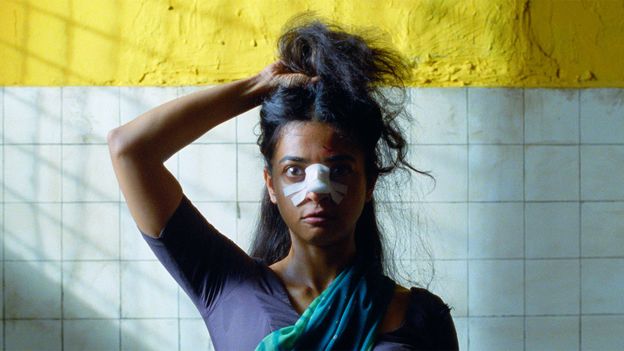“I wanted to know if you took somebody like Santosh, shut up in the kitchen of her house, and you put her in that place, what’s her response to that?” she explains. “I wanted to ask if there was a way to be a woman that’s not about being a man, and not about being oppressed. Is there some other way in her society in which she can be, and that there may be a line she steps over?”
Santosh, which was made in Hindi, was the UK’s Oscar entry for best international film in 2025 – one attribute both Sister Midnight and Santosh share is that, though they were filmed in India, they’re made by British Indian film-makers. Sister Midnight’s makers hope to release it in India in 2025, but Suri tells the BBC that Santosh will almost certainly not get a cinema release there.
“We screened it at the Mumbai International Film Festival and had a great response, and I was moved by just how real the film felt to a local audience,” she says. “But it looks like the film won’t release in India, sadly, as it was admitted to the censor board (CBFC) and there were so many cuts, I couldn’t maintain some semblance of a film.”
Censorship in India
Indian censorship decisions have frequently caused controversy: in 2017, the decision to ban the feminist Indian movie Lipstick Under My Burkha for being “too lady oriented” caused an outcry, and was later overturned after negative publicity. But many homegrown blockbusters are self-censoring, especially when it comes to sex and sexuality.
The 2021 Telugu-language hit Pushpa: The Rise, the story of a smuggler, removed a scene where the hero Pushpa (played by Allu Arjun) touches the chest of the heroine, Srivalli, because of complaints from the audience. In 2024, Pushpa 2: The Rule again caused controversy in India, according to Shubhra Gupta, because of an insinuation that Srivalli (played by Rashmika Mandanna) might want to be sexually intimate with her husband.
“The [female] character acts very cute, she comes on to the hero and is very playful when she wants a little assignation,” Gupta says of it. “The rest of the film she’s serving the hero. She wants her husband not to have sex with anyone else. But in fact, it became a real talking point in India because it’s not something heroes or leading ladies in the movies are supposed to have conversations about.
“And our mainstream film experience is still very much that if a woman has a sexual experience outside marriage, there will be some castigation attached to it,” she adds. “She won’t be ‘pure’ anymore, she’ll be known as ‘bold’ which means she’s been around.”
It makes Payal Kapadia’s acclaimed film All We Imagine as Light seem more audacious in terms of its exploration of sex. The first ever Indian winner of the Cannes Film Festival’s Grand Prix is the story of a nurse, Prabha, who’s been abandoned in her arranged marriage. Meanwhile, her younger flatmate Anu, a Hindu, wants to get intimate with her Muslim boyfriend, itself another taboo. There’s no talk of marriage in advance.









